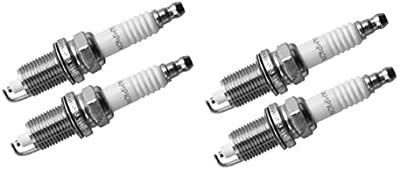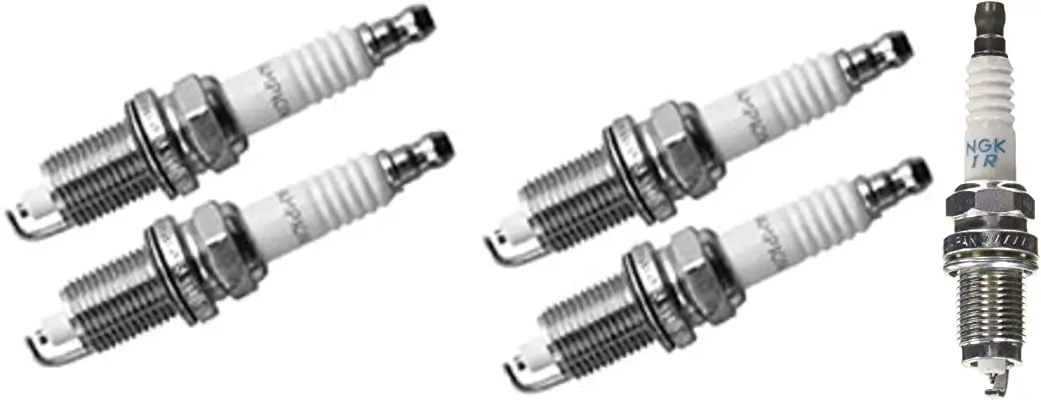Spark plugs are essential to the engine and play a significant role in car performance. They are always small-sized and connect to electricity through an arc-like path. Although small, they offer the spark that ignites and triggers the engine fuel producing a subtle explosion that helps the engine provide power.
There are a lot of different spark plugs in the market, but NGK and Champions tend to be the best and most competing ones. The two offer various benefits and options that render them less or more suitable for particular cars. The significant difference between the two is their heat ranges and the price. Champion spark plugs are long-lasting and do not need frequent replacements, while NGK is cheaper with good heat resistance, making them ideal sparks used by many car manufacturers.
Champion Spark Plugs Vs NGK In a Table
| Particular | Champion Spark Plug | NGK Spark Plug |
| Definition | Champion spark plugs are long-lasting and do not need frequent replacements. | Champion spark plugs resist longer oil penetration and corrosion |
| Design | Spark plugs use sintered metals, which are produced from pressing powder metal. | NGK uses a nickel alloy with copper cores. |
| Resistance to corrosion | Champion spark plugs resist longer to oil penetration and corrosion | NGK offers little resistance. |
| Heat Dissipation Capacity | Champions feature better performance and prolonged usage in even higher temperature conditions. | NGK’s performance and heat dissipation capacity cannot beat that of Champions. |
| Conductivity | Champion Spark Plug is better and has higher conductivity than NGK. | NGK spark plugs have better and higher conductivity. |
| Size | Tread Diameter:0.551 | Gap Size: 0.40 inch. |
| Type | Copper plus spark plug | Single platinum spark plug |
| Control | Copper Core Center Electrodes allow for accurate control. | Highly durable diapers are perfect for lasting against electrical and chemical wear. |
| Lifespan | Lifespan on average is 12,000 miles. | Lifespan on average is about 30,000 miles. |
| Performance | V-Trimmed Ground Electrode promotes Sharper spark plug. | The trivalent metal plate offers superior anti-corrosion and anti-seize properties. |
| Price | V-Trimmed Ground Electrode promotes a Sharper spark plug. | NGK spark plug price is around $35-$40. |
Champion Spark Plugs vs. NGK: Major Differences
Design
The NGK and champion spark plugs are made of different materials, while NGK uses nickel alloy with copper cores. Champions spark plugs use sintered metals produced from pressed powder metal.
Heat Dissipation Capacity
Champions feature better performance and prolonged usage in even higher temperature conditions. They can withstand hot temperatures for up to ten hours before requiring a replacement. On the other hand, NGK’s performance and heat dissipation capacity cannot beat that of Champions.
Resistance to corrosion
Champion spark plugs are designed to resist longer-term oil penetration and corrosion, while NGK offers little resistance. This is due to the fact that NGK’s alloys offer better resistance against wear and tear, as well as other environmental factors.
Comes along with Anti seizing
NGK TMP spark plugs are made out of authentic metal which doesn’t corrode, and they have an ultra seal housing to ensure that the protection against corrosion is maximized. On the other hand, Champion’s TinTac and Ultraseal housing protect Spark Plugs from corroding in any way.
Extended Shelf Life
NGK spark plugs are a big catch because they have Platinum welded to their back. This helps them last longer while also securing it from the ground. However, Champions managed to give an impressive service thanks to their copper core heat control system.
Enhanced Fuel Economy
NGK spark plugs are known for their low combustion quality, which is one of their biggest strengths. They use very little fuel for emissions and strive off the engine to save you a decent amount of money. thus providing excellent mileage! There’s no need to be skeptical about questioning Champion as a worthy choice when it comes to sparking plugs; they’re affordable, ranked among the best when it comes to all flexing power, and offer great value overall.
Laser-welded platinum centre
The NGK company builds their spark plugs with extra focus on the tips. Both the pole and the thread are made from laser welded Platinum center electrode tip, while Champion’s spark plug is made out of C series 14 mm thread with 5/8″ hex, Fine Wire Tip. It has a small diameter central electrode that was designed to improve starting and anti-fouling.
Longer life
Champion spark plugs are built with the copper core as their centre. It allows for the precise number of heat range control that prevents them from melting and avoids malfunction. They also have an extended service life, which is likely because they use a higher-quality electrode than other brands.
Champion Spark Plug vs. NGK Spark Plug: Similarities
High-Quality Spark
Champion spark plugs and NGK spark plugs are both used for supplying a high-quality spark. Champion spark plugs offer more resistance to wear, meaning they can last longer in the engine. Additionally, their design provides consistent sparks every time so you’re less likely to have to change your plugs often.
Fitment
Champion Spark Plug and NGK spark plugs are both designed to fit a wide variety of vehicles. They feature an adjustable air-fuel Ratio, Knock Sensor Detection, Throttle Position Sensor (TPS), and more.
Extended life
Both NGK and Champion spark plugs offer extended life through their use of platinum back in the spark plug. This ensures that your engine will run longer with minimal wear and tear, on the same types of fuel you would use for regular driving.
Champion Spark Plug- Best For Protection Against Corrosion

Champion spark plugs are made to resist long periods of oil penetration and corrosion, ensuring that your engine will run like new. TinTac housing prevents corrosion, and its Ultraseal design ensures that there is maximum protection against it.
Pros
- The company’s prompt customer services
- Champions spark plugs are of the highest quality
- The spark plugs from Champions are reliable
- They are resistant to corrosion.
Cons
- Some engine models are not working properly.
- It is less conductivity than NGK
NGK Spark Plug- Best For Extended Shelf Life

There is a big catch with NGK spark plugs- they have a Platinum disc welded to their back. This means that the electrode provides long life while the platinum base backside Secures it from the ground.
Pros
- It is durable
- They exhibit a better fuel economy
- They have lower emission
- These spark plugs have better and higher conductivity.
Cons
- NGK offers little resistance
- This plug seemed to misfire even after the gap re-adjustment.
FAQ
Which is better, NGK or Champion?
It can be difficult to choose the better option when both options offer various benefits. Both NGK and Champion spark plugs are popular in the USA for everyday use, so it makes sense that they would be better than each other. However, experts agree that NGK is the better choice for most people. However, Champion Spark Plugs are often spotted on most cars in the USA for everyday use.
Are NGK Spark Plugs good?
NGK offers high-quality, comprehensive applications catalogs and performance that make them an excellent choice for standard electrode and noble metal tip spark plugs. Furthermore, their units are always of high quality.
Which brand spark plug is best?
The NGK 6619 Iridium IX spark plugs snagged the top pick in our spark plug comparison because they offered the best mix of high performance, fuel efficiency, durability, and dependability. Featuring an iridium construction, these high-quality sparks ensure a longer lifespan than copper and platinum sparks.
Final Words
Comparing NGK and champion spark plugs is important in order to make the best choice for your automobile. However, it’s not just NGK that offers high-quality products; Champion also does a great job! Their ratings range from 4.7 stars out of 5 (Iridium) to 4.8 out of 5 (copper and platinum) which makes them an affordable option for those looking for quality spark plugs at a good price point.
Read also

